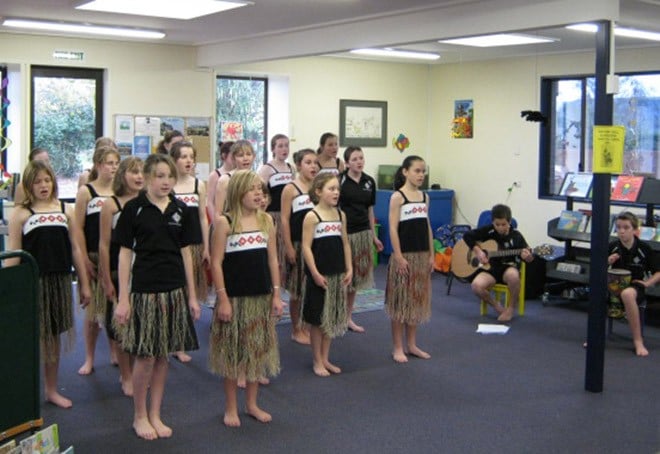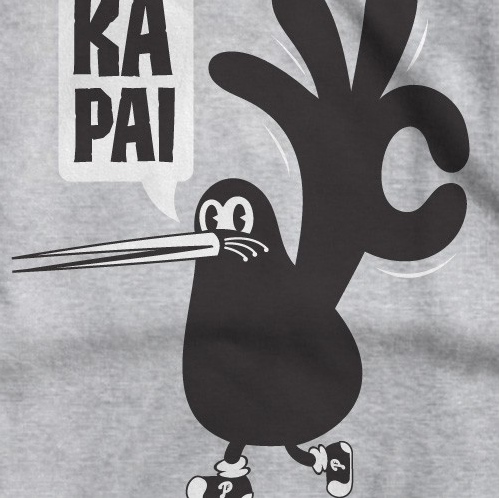What Australia Can Learn From New Zealand’s Approach To Indigenous Languages In Schools
At school assemblies, kids sing the full national anthem in Maori and then again in English. I still remember the words.

After much consultation and development with Indigenous communities, NSW Education Minister Adrian Piccoli finally dropped the big news yesterday: Aboriginal languages will be available to study as an HSC subject from 2016. This comes 11 years after the state announced its first official Aboriginal languages policy geared at better including the subject in the state education system, and ten years since a syllabus was rolled out for years K-10.
“This new course will help maintain this critical part of Aboriginal cultures,” Piccoli said yesterday, while visiting a regional public school near Broken Hill. “This course will aid Aboriginal young people to become the future custodians and caretakers of their languages and empower them to maintain a strong sense of identity,” NSW Minister for Aboriginal Affairs Leslie Williams told The Sydney Morning Herald. “For non-Aboriginal young people it will provide them with a deeper understanding of the world’s oldest living culture.”
And of course, they’re right. With a specific focus on community practices, traditions, and the purpose of Indigenous language rather than the specifics of individual dialects’ meanings, syntax, and pronunciation, the draft syllabus is sorely needed. Though it won’t count towards the students’ ATAR scores, it will provide invaluable knowledge about one of the most overlooked aspects of Australian culture; a welcome addition to a curriculum that’s otherwise overwhelmingly preoccupied with calculus, Nazis, and Every Single Thing That Happened At Gallipoli.
But as I watched people celebrate the news, I couldn’t help but feel a little confused: how the hell had this not happened already?

This is the part where I out myself as a New Zealander.
It’s no secret that my home country of New Zealand has a much better relationship with its indigenous culture than Australia, but most Australian people I talk to seem genuinely surprised about what that looks like in practice — particularly when it comes to language.
When I was young, the closing jingle to my favourite show was performed by a white New Zealander (Pākehā) in both English and Maori. “Ka kite, see you later” she sang. “Au mahue ahau, I’m leaving, I’ve really got to run.” Kids would sing along to this, effortlessly incorporating the phrases into the way we spoke more generally.
This carried on through my whole education and corresponding family life. In primary school, every teacher would greet us in Maori (Tēnā koutou tamariki ma) and we’d all dutifully reply “Tena koe, [Mr/Mrs Whoever]” in that weird sing-song voice exclusively reserved for the classroom. Phrases like this weren’t explicitly taught, just scattered throughout the regular syllabus. We learned whanau meant family, aroha was love, lunchtime was about getting some kai (food) in our puku (stomach). At school assemblies, kids sing the full national anthem in Maori and then again in English. I still remember the words.
This continued in years seven and eight when the “cultural club” was a regular extracurricular activity; kids of all races and nationalities would learn how to make flax baskets, make pois and perform traditional Maori dances. The awards ceremonies at my intermediate school were always accompanied by a bunch of scrawny, bare-chested white kids and some slightly amused Maori and Pacific Islander students doing the haka. We’d sometimes accept prizes by shaking the principal’s hand then leaning in for a hongi (where you touch foreheads and noses as a form of greeting and respect). The only time it ever seemed strange or embarrassing is if the grown-up had bad breath. This happens all over the country.

Some adorable little dweebs via Dunedin Public Libraries/Creative Commons.
As we got older, the topics became more serious. My high school had a marae (a sacred Maori meeting place) on campus where we’d sometimes go to learn about traditional notions of community and religion. An official Maori language subject was taught as an option alongside French and Japanese. In social studies classes we’d learn about early life in the Pacific Islands as well as the signing of the Treaty of Waitangi (the founding document between Maori people and the nation’s first European settlers) and how it applies to race relations today.
This isn’t to say New Zealand’s perfect. Like any communities invaded by Europeans, the nation’s Maori population has its problems and I don’t for a second think I can speak to them or the Maori experience at large. Even through all this, I never felt particularly knowledgable about the culture. But comparing my meagre experience to what most white Australians know about Aboriginal culture, I feel like an expert. I feel proud that my country is officially bi-lingual; that the nationality on my passport reads Pākehā instead of simply “New Zealand”.
Hopefully bringing Aboriginal languages into schools will pave the way for this kind of Indigenous recognition in Australia. And, though it’s made seemingly more difficult by the sheer number of languages and dialects — there are 35 different Indigenous languages in NSW alone — some experts say that may not be as big of a problem as it sounds.
“It’s not the number of languages that’s the issue, it’s the attitudes,” said Jakelin Troy, Director of Aboriginal and Torres Strait Islander research at the University of Sydney when speaking to stuff.co.nz recently. “The problem we have in Australia is, as an Aboriginal kid, you more or less need to leave your Aboriginality at the gate when you go to school … The government pays lip services to our languages at best and at worst, it completely ignores [them].”
So hey, at least we’ve moved on from the latter?
–
Read more about the HSC Aboriginal Language syllabus here.
